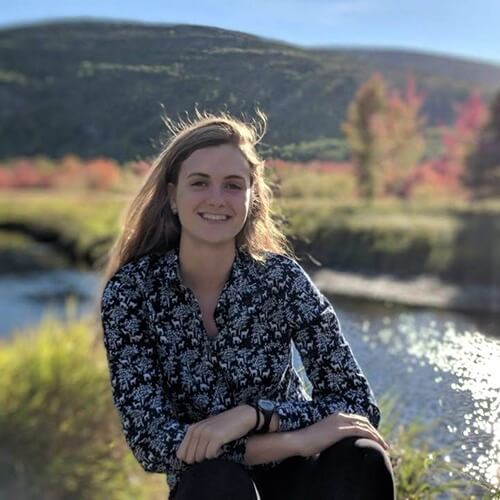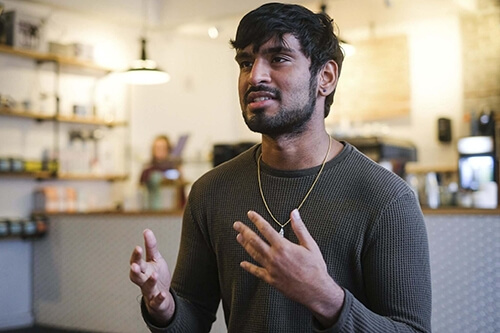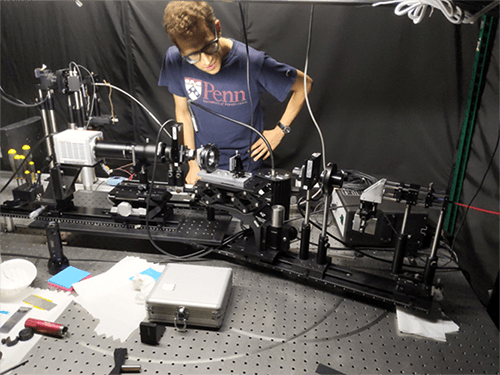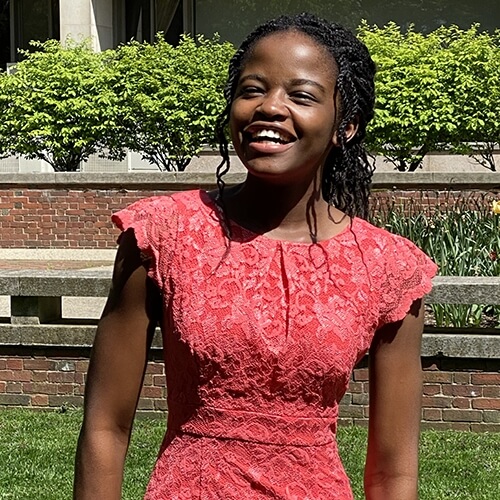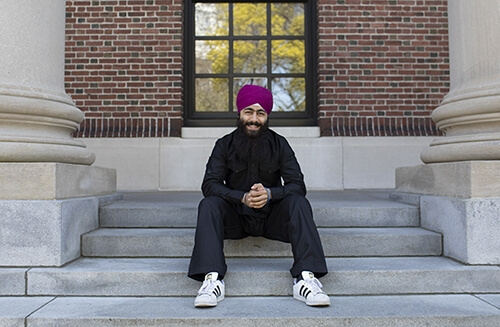News
During Harvard’s virtual graduation program on May 28, 523 students joined the SEAS alumni ranks—365 earned bachelor’s degrees, 105 earned master’s degrees, and 53 earned doctoral degrees.
Meet a few of the newest SEAS alumni.
Harshal Singh, A.B. '20, computer science
What is one of your favorite moments from your time at SEAS? Why was it so meaningful?
Harvard SEAS was an incredible part of my undergraduate experience, and I was so lucky to be a part of the community over the past four years. From giving tours of the engineering labs to prospective students, to staying up and working on a lab assignment to make a circuit come together, I got so much out of SEAS. Out of everything, I think my favorite memories were working with the Active Learning Lab staff on all the small projects, tinkering, and little gadgets I could think of. Having a lab that was open for all students (with the appropriate training, of course) and people like Steve Cortesa and Elaine Kristant who were always available to help advise you with your personal projects, helped so many dreams, small and large alike, come to life. For me, this was a 3D printed robot arm, a foldable chair, and an assortment of laser cut gifts for my family. As a computer science concentrator, working on projects with my hands helped me become a more well rounded engineer.
What is a lesson you learned in your time here that you will take forward into your professional career?
Having the flexibility to build whatever I wanted, whenever I wanted, shaped my college experience. It helped me be as creative as I possibly could, and helped me decide on what I’ll be working on after graduation: launching a startup (Troav, Inc.). I knew I loved building things, and the next chapter of my life will be defined by building what I hope to be the future of ownership. I can’t wait for the years ahead, and can’t be grateful enough for what I learned as an undergraduate at Harvard.
Sophie Pesek, A.B. '20, environmental science and engineering
What is one of your favorite moments from your time at SEAS? Why was it so meaningful?
I knew I had found the right field of study when I immediately hit it off with my teachers and classmates in Introduction to Environmental Science and Engineering (ESE 6). They were all people just as passionate about environmental issues and implementing real projects to alleviate those problems. I am so grateful for the community of environmental engineers that I've been a part of these past four years.
What is a lesson you learned in your time here that you will take forward into your professional career?
The greatest lesson I've learned at SEAS is to never lose sight of the people. Engineering is not just about building a structure, model, or device for the sake of it, but instead about finding problems that are hurting our world and trying to create something that can help. I've been lucky to see this lesson reinforced time and time again by my amazing teammates in Engineers Without Borders and the passionate SEAS peers I've come to know. I am excited to see how we can use human-centric design to make the world a better place.
Sai Rajagopal, A.B. ’20, joint concentrator biomedical engineering and women, gender, and sexuality
What is one of your favorite moments from your time at SEAS? Why was it so meaningful?
One of my favorite moments at SEAS was taking our photos for our ES 227 (Biomedical Device Design) final project. We were all sleep-deprived from last-minute building, but visualizing our project with a professional background allowed us to see how far we had come from initial CAD renders.
What is a lesson you learned in your time here that you will take forward into your professional career?
Everything you need to function for your project will definitely break at the last minute. Always try to finish your project a good few weeks before a major deadline—you'll likely end up finishing right on time.
Where are you going now?
I'll be going to Oxford on a Rhodes Scholarship.
Noah Rubin, Ph.D. '20, in applied physics
What is one of your favorite moments from your time here, either inside or outside the lab? Why was it so meaningful?
Over five years, there are too many to describe. Of course, I will always fondly remember jokes with colleagues and spending time together in the lab and out of it (lunch together, going out to dinner, even traveling together). It may sound odd, but many of my most memorable moments were spent alone. A Ph.D. gives you a unique chance to learn extensively on your own, to formulate and explore new ideas. Some of the most satisfying experiences I've had at Harvard are when something made sense to me for the first time, or when I saw a new path forward. It is almost philosophical sometimes. But the fact that the work we do may have practical implications for real-world optical technology is always a grounding force. I have really appreciated the opportunity at Harvard to move between abstract, foundational work and very tangible engineering-oriented tasks. This is the spirit of applied physics.
What is a lesson you learned in your time here that you will take forward into your professional career?
Physics is about getting to the heart of the matter. If something cannot be explained in a relatively straightforward way, free of jargon, there may be a conceptual issue lurking in the shadows. This must always be kept in mind. Expertise cannot always be presumed. As a Ph.D. student, you quickly realize that even seasoned researchers and engineers may not know exactly what they're doing or where they're going. In time, then, you come to realize that while your own sense of uncertainty may never go away, it doesn't need to hold you back. This is a lesson I attribute in large part to my advisor, Prof. Federico Capasso.
What was the focus of your research here?
My research has focused on polarization, a fundamental quality of light. In particular, I have examined how unique optical devices known as metasurfaces may enable new technologies for controlling and analyzing light's polarization state.
Where are you going now?
The research conducted during my Ph.D. has a number of practical applications. One in particular is in understanding the properties of clouds - a major factor of uncertainty in climate change - using special cameras that measure light's polarization. We were awarded a grant from NASA to study whether some of our technology could play a role in the future of these measurements from space, perhaps onboard a satellite. For the time being, I am fortunate to be able to stay on as a postdoctoral fellow to extend this and other research.
Sela Kasepa, A.B. ’20, computer science
What is one of your favorite moments from your time at SEAS? Why was it so meaningful?
One of my favorite moments was getting to build a robot when I took Computer Aided Machine Design (ES 51). It was so meaningful because it provided me with a hands-on learning experience, and showed me just how capable I am to build and innovate. It was this experience that spurred in me the drive to promote robotics in my home country, through STEM. This experience also emphasized teamwork, which I greatly appreciated; my peers not only challenged and helped me but also allowed me to enjoy my work as we clocked many nights away chorusing to songs from Disney movies such as Moana.
What is a lesson you learned in your time here that you will take forward into your professional career?
As we relentlessly pursue our goals, we need to take the time to look around, observe our surroundings, and actively work on our interactions with others.
Where are you going now?
I will be going to Redmond, Wash., where I will join Microsoft as a software engineer.
Awnit Singh Marta, S.B. '20, electrical engineering
What is one of your favorite moments from your time at SEAS? Why was it so meaningful?
One of my favorite times was getting the entire class to dress as Dr. Chris Lombardo for Halloween. Khakis, carabiner on the belt loop, travel mug in hand. He was teaching Introduction to Electronic and Photonic Devices (ES 173), a class I decided to take after completing a SEAS summer program with Dr. Lombardo that took place both in Cambridge and South Korea. The moment reminded me of how approachable, friendly, and genuine staff at SEAS are; I never felt alienated by any professor, even if I wasn’t performing well in their class.
What is a lesson you learned in your time here that you will take forward into your professional career?
Harvard has taught me to care about time, to be intentional about it. There are hundreds of things that Harvard has to offer and I always felt at odds about the things I was getting involved in. I decided to spend much of my time on fostering small communities rather than contributing to already existing organizations, for example, the British Club and Harvard Bhangra.
Where are you going now?
I will be heading to New York to gain experience in software engineering as a tech analyst. I hope that this will help kick start a journey into socially impactful startups.
Topics: Academics
Cutting-edge science delivered direct to your inbox.
Join the Harvard SEAS mailing list.
Press Contact
Adam Zewe | 617-496-5878 | azewe@seas.harvard.edu

